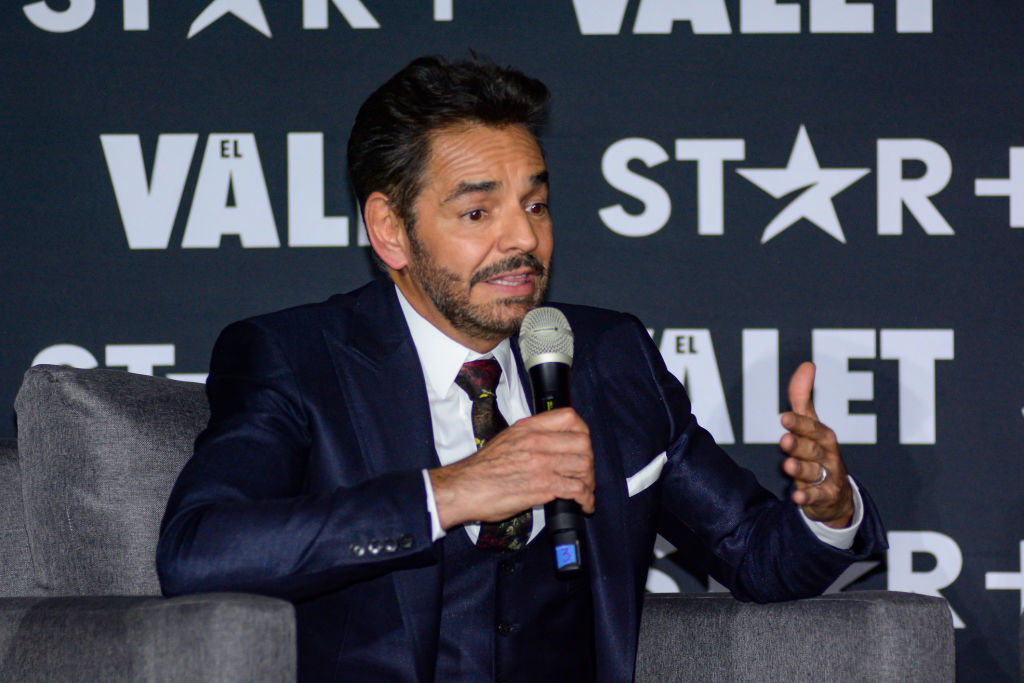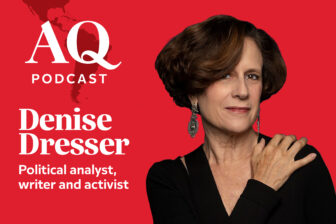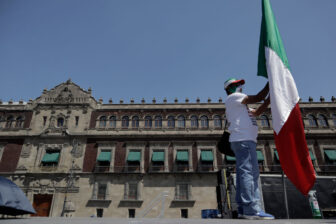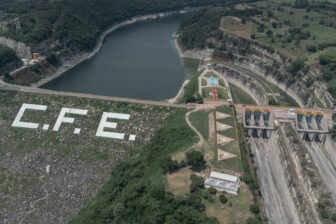Eugenio Derbez rode to comedic stardom at the helm of a sitcom set in a make-believe city where people don brightly colored plush outfits. Now, scoring 19% in a September poll for Mexico’s 2024 presidential race, he has outperformed all contenders from the country’s traditional opposition parties, the PRI, PAN and PRD—even though he’s not officially a candidate.
Though his appearance in the survey might seem like make-believe, pollsters gave good reason to include the actor, who left the sitcom world behind a decade ago in favor of Hollywood blockbusters like CODA (2021) and The Valet (2022). One is name recognition—but another, as poll organizers from major media outlet Reforma put it is “his participation in topics of public debate.”
Derbez landed at the center of political controversy a few months back as the most well-known celebrity to join a campaign against the Tren Maya, an $8 billion, signature infrastructure project of President Andrés Manuel López Obrador’s government that involves building a train circuit through the jungles and over the underground water cave system of Mexico’s Yucatan Peninsula. The participants in the campaign, dubbed “Sélvame del Tren” (a play on words in Spanish to say “Save me from the train”), sought to stop a portion of the construction known as Section 5, which connects the tourist hotspots of Cancún and Tulum. They argued that, without appropriate studies or consultations with local residents, environmental and archaeological destruction will occur.
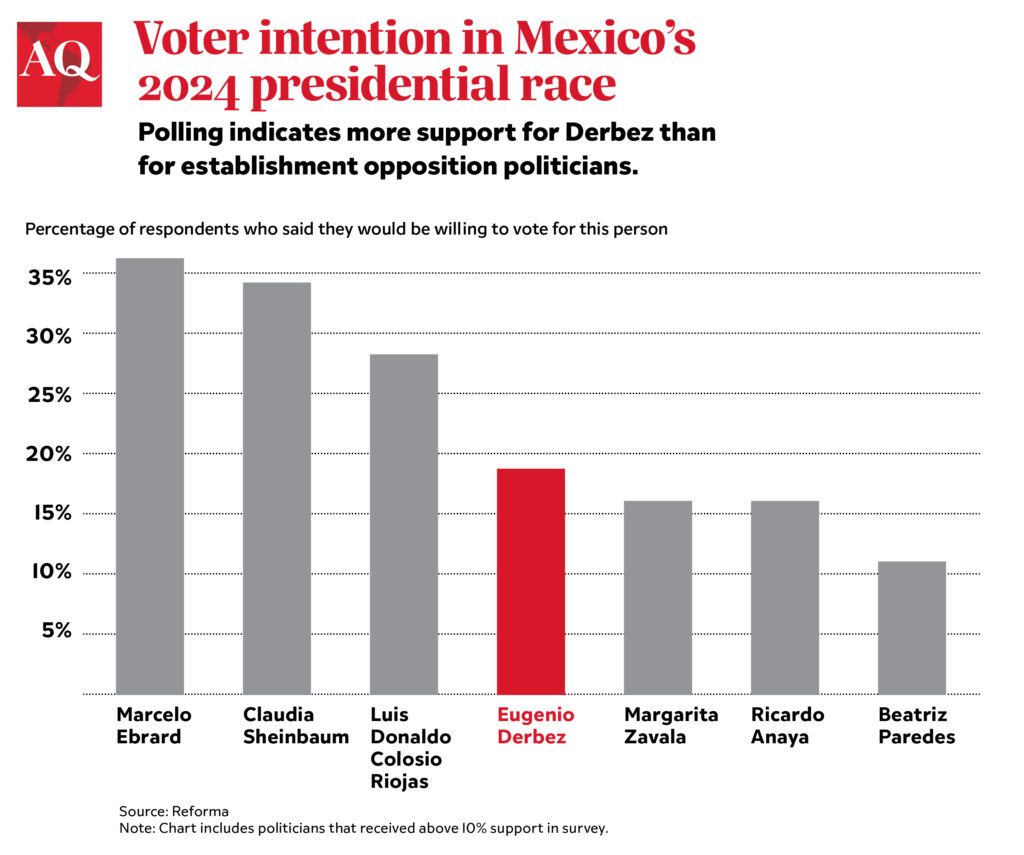
López Obrador, or AMLO, responded by calling the celebrities conservatives and fifis (snobs)—two of his preferred labels for his critics. Still, he invited the participants to the National Palace for an April dialogue about Section 5, which has been embroiled in a series of legal battles. The campaigners pressured to hold the meeting at the construction site instead to bring attention to environmental damage, but accepted the invitation in the capital. Then AMLO called off the meeting last minute, saying many of the famosos canceled. But it appears only one did so: Derbez. He released a video in which he was on set, saying that, out of roughly 70 participants, only he could not attend because he was under contract and filming on location.
In other words, he was doing his job—being an entertainer. And yet the actor, who has declared no intention of running for any form of political office and has made it pointedly clear that he is busy with his movie career, featured near the top of a poll to be the country’s next president.
Another reason for including Derbez in the survey? The popular actor accomplished something few political adversaries had: He got under the skin of AMLO, who commands a 62% approval level, higher than any of his four predecessors at the same point in their term.
Indeed, AMLO and his party, Morena, have had little difficulty making gains since seizing power in 2018. In less than a decade, Morena has snatched up two-thirds of the country’s governorships, a majority of state legislatures and the largest number of congressional seats. Moreover, recent developments put the establishment opposition’s fragility on full display.
In the time since the Reforma poll came out, Mexico’s Congress passed a reform, introduced by the president, that transferred the country’s 110,000-strong National Guard from civilian to military control. It was a political win for AMLO, who, despite his “hugs, not bullets” security policy, has expanded the military’s role and put the armed forces in charge of everything from protecting ports to building key infrastructure projects —including Section 5 of the Maya Train.
The president’s reform was also a political win in that it exposed the fault lines in the tenuous Va por México alliance, made up of three traditional parties—the PRI, PAN and PRD. Va por México has served as a counterweight to Morena’s legislative majority, even blocking AMLO’s landmark statist electricity reform in April. This time around, though, the PRI’s president, Alejandro “Alito” Moreno, sided with Morena on the National Guard reform, delivering key votes to help it pass. His move put the opposition alliance on thin ice, caused rifts within his own party, and showed Morena has the capacity to co-opt the once-mighty PRI, which held the presidential seat for nearly 80 of the past 100 years before voters punished the party in 2018 for a wave of corruption scandals that engulfed the party’s governors, ministers, and then-President Enrique Peña Nieto himself.
None of this is lost on the president. Ahead of his annual September 1 state of the union, AMLO released video spots saying, “No somos iguales” or “We’re not the same,” decrying the “neoliberal governments” that came before his own. In a Latin American context where incumbents keep getting shown the door, AMLO is keen to pitch his party as an anti-incumbent movement.
That helps explain why he all but launched the presidential race more than a year ago—and only halfway through his six-year term—when he described himself as a bottle opener, comparing potential candidates to bottle caps, or corcholatas. Since then, presidential hopefuls have been uncorking their intentions to run, engaging in campaign-like activities despite the main electoral body’s attempts to stop them. With the help of the president’s political capital, Morena’s corcholatas lead in polling, with Foreign Minister Marcelo Ebrard (36%) and Mexico City’s Mayor Claudia Sheinbaum (34%) topping the Reforma survey.
But Derbez polling fourth doesn’t just highlight the inability of the traditional opposition to, at least at this point, come up with a viable name. It also shows, on the other hand, that a good chunk of Mexican voters are looking for other options. After all, polling third with 28% is another figure who hasn’t indicated any plans to run: Luis Donaldo Colosio, mayor of Monterrey, Mexico’s second-biggest city, and member of another non-establishment party, Movimiento Ciudadano. Though relatively new to politics, the 36-year-old Colosio carries a symbolic legacy; his father, a presidential candidate of the same name, was widely seen as trying to bring change to the PRI when he was assassinated on the campaign trail in 1994.
One has to ask how long it will take before voters view Morena as part of an establishment that fails to improve the country’s problems. Even if Mexicans largely support the president, another recent Reforma poll shows they disapprove of his government’s handling of organized crime, security, the economy, and even corruption—the very issue AMLO pledged to tackle and helped him win office. That a sizeable portion of voters would be willing to cast a ballot for a newcomer mayor or a famous comedian shows they want additional choices. There are still two years to go. Who might come forward?
—
Zissis is editor-in-chief of AS/COA Online.


